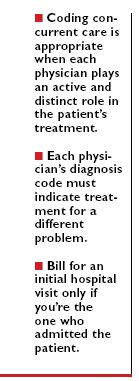Article
Coding Consult
Concurrent care

When more than one physician provides services to the same patient during the same time period, coding for concurrent care is appropriate-as long as each physician plays an active and distinct role in the patient's treatment, says Bruce Rappoport, an internist and healthcare consultant at Rachlin Cohen & Holtz in Fort Lauderdale.
Following are three common scenarios that trip doctors up.
The most common reason for a concurrent care claim denial is an incorrect diagnosis code, experts say. For example, say a cardiologist admits a patient to the hospital for congestive heart failure (428.0, congestive heart failure, unspecified). The patient develops pneumonia (480.9, viral pneumonia, unspecified), and the cardiologist calls you, the patient's internist, to treat it.
Your documentation reads: "Patient was admitted for congestive heart failure, and I'm seeing him for pneumonia." You report a subsequent hospital care code (99231-99233) with 428.0 as the primary diagnosis and 480.9 as the secondary diagnosis, and you receive a denial.
That happened because both you and the cardiologist reported the same diagnosis code, so the payer thought that both of you were providing the same services, says Barbara Cobuzzi, a coding and reimbursement specialist and head of CRN Healthcare Solutions in Tinton Falls, NJ. Instead, you should have used only 480.9 as your diagnosis code, because you treated only the patient's pneumonia. "The key to concurrent care is that your diagnosis code indicates a different problem," explains Suzan Hvizdash, a physician education specialist for the department of surgery at UPMC Presbyterian Shadyside in Pittsburgh.
Your documentation should clearly state that you aren't treating the patient for the same problem as the cardiologist. Document that the cardiologist admitted the patient for congestive heart failure, but during the course of his hospitalization he developed pneumonia. At that time, you began treating the patient's pneumonia, not the congestive heart failure, Hvizdash says. "You almost have to overstate your point," she adds.
When both doctors code an initial hospital visit
Remember that Medicare pays for only one initial hospital visit per patient admission. Unfortunately, say experts, the physician who receives the reimbursement may not be the one who rightfully deserves it.
Let's say you admit a diabetic patient for gangrene developing in her left foot (785.4, gangrene). A general surgeon examines the patient later that same day to determine if the foot should be amputated.
You report initial hospital care code 99222 (initial hospital care, per day, for the evaluation and management of a patient . . .), and the general surgeon mistakenly reports 99222, as well. Because the surgeon's claim went out to the payer faster, Medicare pays his claim and denies yours.
"We tell physicians that it doesn't matter whether it's the first time they see a patient in the hospital. They can't bill the initial visit unless they're the one who admits the patient," Hvizdash explains. If you didn't admit the patient, bill a subsequent visit (99231-99233) or a consultation (99251-99255) if the documentation can support the claim, she adds.
When you coordinate a patient's care
Be careful when submitting concurrent care claims for coordinating a patient's care. Make sure you can identify exactly which billable services you provided to the patient, Hvizdash says.





